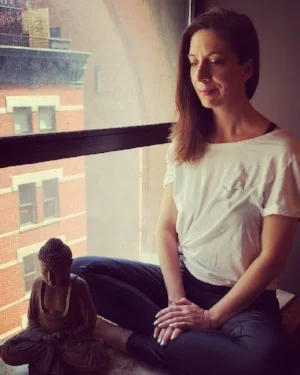I've always liked the physicality of Reiki. Of bringing mind and body together through hands-on healing, chanting, or the breath. I've been reading an excellent book about body awareness. I wanted to share a few insights about kinetic sense, feelings of being embodied, and wellbeing that really felt relevant for Reiki practice.
In the simplest explanation, your kinetic sense allows you to feel where your body is and to manage movement. That implies vast amounts of data being processed. For example, if you are walking on an incline, the brain will sense through the body all the necessary adjustments to be made for walking efficiently. Your kinetic sense also allows you to feel muscle pain, tension, and relaxation.
Your kinetic sense, however, goes beyond sensing your body. When you are stressed out about something, you notice your abdomen tightening. A kinesthetic experience is, therefore, an emotional experience. People who can't listen to their bodies are not fully connected to their emotions. And by being less in touch with their bodies, they may also suffer from a lack of muscle flexibility, which in turn can affect their perspective in life.
"Kinesthetic awareness affects your physical and emotional flexibility. These two types of flexibility are not separate; they support one another. When your kinesthetic sense is clear, you can experience your feelings as they occur. Essentially, this means you know yourself. As a result, you are more flexible in dealing with stress and better able to make choices about your life circumstances," explains Craig Williamson in his book Muscular Retraining for Pain-Free Living. "We would need to understand the importance of kinesthetic awareness, to stop being disembodied people, and to become embodied people."
Many times we believe that the hand-positions order or sequence is one of the most relevant variables in a Reiki treatment. But when you read this, it points towards awareness as the crucial element of this practice. To use our hands to listen to both our bodies and our emotions. To soften our muscles, and make us more flexible in every sense. To be fully present, to detect worry and anger so we can let them go, to connect with gratitude and compassion. In a few words, to literally embody the precepts.
As the weeks go by, it amazes me how fast we can adapt to the new normal. I do what I need to do, and then my new chill time consists of texting with my niece about which face masks are the cutest, watching martial art movies, and indulging in some social media binging.
On these binges, I see many posts like “anxiety is a choice,” “anger is a choice,” “gratitude is a choice.” I totally get and agree with this sentiment. But I also wonder, is it as simple as that? Do we have a choice when our nervous system is in overdrive? When our survival brain is pumping adrenaline like mad into our bodies to keep us safe from what it perceives as aggression?
So perhaps it’s not really a matter of choice, but a practice, like in martial arts. Instead of repeating a move over and over until it becomes second nature, we learn how to come back to our breath when we lose it. To our bodies. To the present. Over and over. To let go of the future, of over planning, of anxiety. To forgive ourselves when we become angry or forget to be grateful. Over and over, until it gets easier.
Remembering that, like in meditation, getting distracted by anger or anxiety is not a “fail.” It is part of the practice.
That the healing is in the return.
Not in being always perfectly centered.
A few weeks ago, I took the subway to pick up the car in the garage and drive my family to Connecticut. I was carrying my dog, a freezer bag, and my regular bag, in which I had stowed my computer, wallet, phone, keys, etc.
I exited the train on Christopher Street with the dog in my arms, the freezer bag on my left shoulder… and no bag.
As I watched the number 1 train disappear with my bag in it, my heart almost stopped. I couldn’t breathe. I didn’t know what to do. I had no money, no phone, no keys and there were two nervous octogenarians waiting for me.
I started spiraling down for a couple of minutes and then... I bounced back. I started breathing deeper and I felt certain things would work out. And they did. I called my phone from the garage and a lovely voice picked up to tell me my bag was safe and I just needed to go and pick it up.
I’m so grateful for this person's kindness. But I’m also deeply grateful for my practice and the fact that I didn’t completely break down (my first impulse when in this kind of situations is to cry while screaming, "Why me?").
When I started my spiritual practice, I did it because I wanted a life where nothing ever went wrong and I always felt great. Instead, crap still hits the fan, but I've changed. Most times I can keep my center. And many times, what seems like disasters end up being my best stories.



